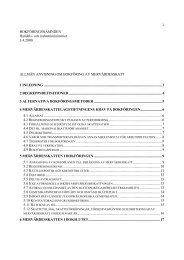Knowledge Intensive Services' Suppliers and Clients
Knowledge Intensive Services' Suppliers and Clients
Knowledge Intensive Services' Suppliers and Clients
You also want an ePaper? Increase the reach of your titles
YUMPU automatically turns print PDFs into web optimized ePapers that Google loves.
31<br />
2.3 Sociology<br />
In contrast to the economic approaches, sociological studies are typically less<br />
concerned with the impacts of KIBS on economic performance than with more<br />
traditionally sociological issues. They thus pose questions about the nature <strong>and</strong><br />
functioning of KIBS <strong>and</strong> the KIBS-client relationship that have to do with social<br />
relations, power structures, the origins of categories, <strong>and</strong> the like. Relatively few<br />
sociologists have actually sought to grapple with KIBS, <strong>and</strong> the construct “KIBS”<br />
is rarely used by them. But there are several lines of relevant sociological research,<br />
for example those that raise issues of the social structures involved in professional<br />
knowledge systems, the operation of markets for “knowledge workers”, <strong>and</strong> the<br />
role of knowledge-based organisations in social networks.<br />
Professionalisation<br />
The literature on the emergence <strong>and</strong> consolidation of professions is one fruitful<br />
field to consider, with useful pointers to the formation of professional <strong>and</strong><br />
disciplinary enclaves which have trouble communicating with each other. 12 Some<br />
KIBS are prone to this problem (with their own jargon, etc.) – but others can be seen<br />
as specialising in bridging such gaps, as translating knowledge for other<br />
parties. Abbott (1988) sees professions in terms of their practices (we discuss<br />
“communities of practice” later).These involve:<br />
• Diagnosis – the process wherein information about the client is taken<br />
into a professional knowledge system <strong>and</strong> assembled into a picture of<br />
the client’s problem.<br />
• Inference – problem classification.<br />
• Treatment – the process whereby results are given back to the client <strong>and</strong><br />
prescriptions are offered.<br />
He goes on to consider the processes by which problems are assigned to specific<br />
professions, academic knowledge is generated <strong>and</strong> integrated into operations,<br />
legitimacy is mobilised where clients are reluctant to accept treatment, etc. There<br />
are insights here as to when things are organised as external KIBS or as internal<br />
12 Abbott notes that “the tasks of professions are to provide expert service to amend human problems”<br />
(p 33). See also his intriguing Chaos of Disciplines University of Chicago Press, 2001; this uses<br />
fractal analysis as a metaphor for the proliferation of disciplines <strong>and</strong> subdisciplines, arguing that the<br />
same fundamental dichotomies (or other distinctions) tend to be reproduced again <strong>and</strong> again as the<br />
social systems grow evermore complex. The approach can be used for professional systems in<br />
general.
















